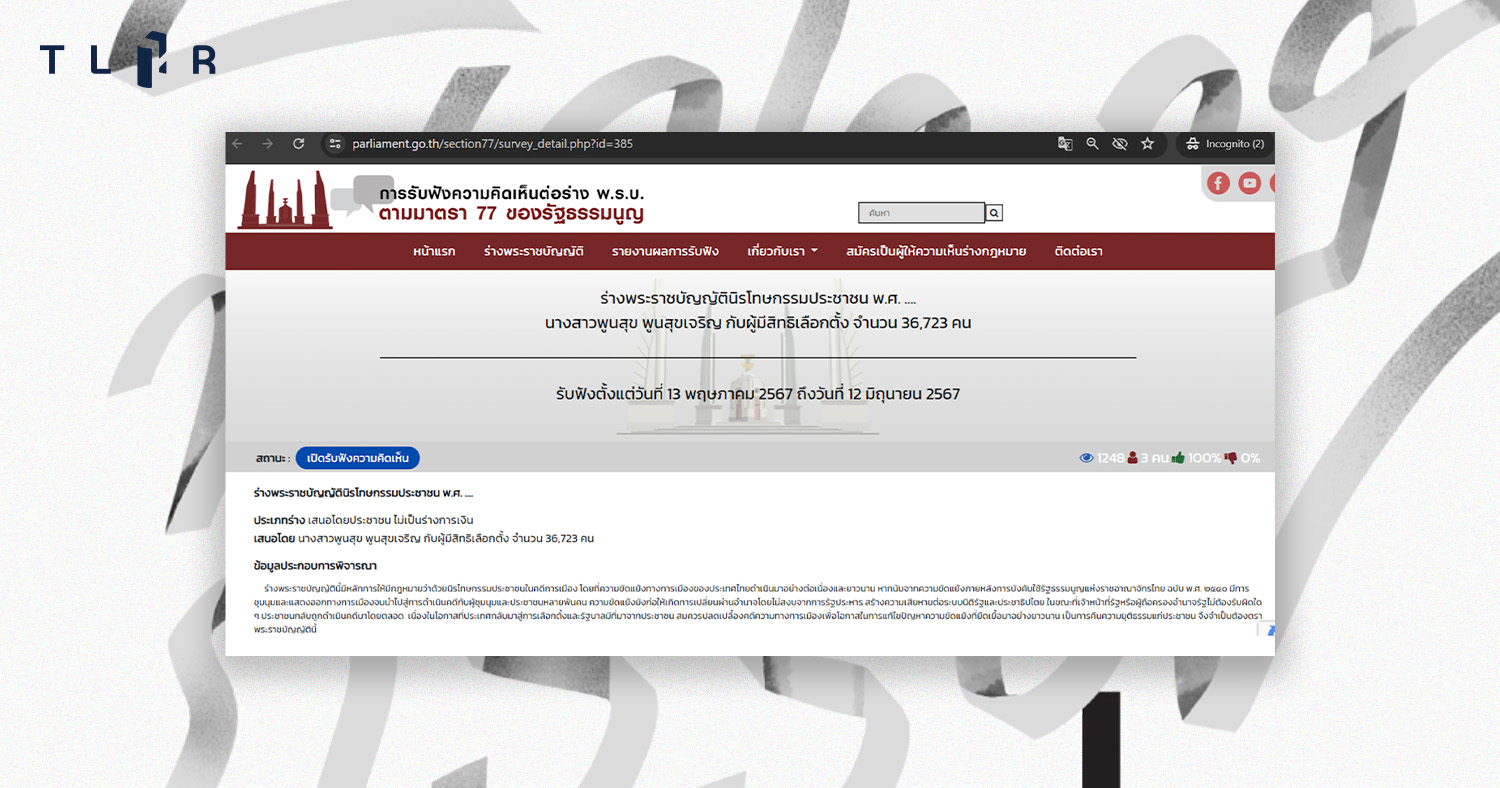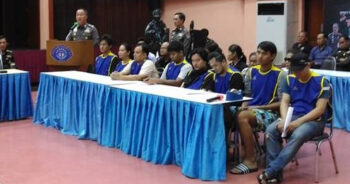On 8 May 2024, Pol. Sub-Lt. Arpath Sukhanan, secretary of the House of Representatives, the Office of the Secretariat of The House of Representatives, sent a letter to Ms. Poonsuk Poonsukcharoen, a representative from the People’s Amnesty Network who kickstarted the introduction of the People’s Amnesty Bill into Parliament. The letter indicates that the Bill is considered not to be a money bill according to Section 134 of the Constitution. Therefore, the Office of the Secretariat of The House of Representatives shall carry out a public consultation and potential impact assessment before tabling it for reading in the House of Representatives.
This Draft People’s Amnesty Act is a bill which aims to stop the prosecution of the exercise of freedom of assembly and political expression. It is a first step toward solving long-running conflicts in Thai society. The Bill has received endorsement through the signatures of 36,723 eligible voters.
At present, the Office of the Secretariat of The House of Representatives has launched a public consultation regarding the Draft People’s Amnesty Act via the website of the House of Representatives. All members of the public are invited to share their opinions within the period of one month (13 May 2024 to 12 June 2024).
.
.
The Office intends to seek consultation via its website on the following issues;
1. Do you agree or disagree with the offering of amnesty to persons committing an offense related to political assembly or political expression from 19 September 2006 until the present, by ensuring that such actions shall no longer count as an offense, and the offenders shall be exonerated from such offense and any liability thereof?
2. Do you agree or disagree that there shall be a “People’s Amnesty Committee” to review and determine which actions shall be eligible for amnesty, and do you agree with its composition, duties, and powers as well as the term of the Committee?
3. Do you agree or disagree that no amnesty shall be granted to persons who have committed an offense under draft Section 5, and the Committee shall not review them?
4. Do you agree or disagree that no amnesty shall be granted to public officials involved with the incidences of public assemblies or the dissolution of public assemblies through excessive use of force, or have committed an offense against Section 113 of the Penal Code?
5. Do you agree or disagree with allowing persons who may be eligible for amnesty, their husband, their wife, their ascendants, their descendants, or persons who live with them as a spouse albeit without registering the marriage, their custodians, or persons under their custody, shall have the right to file an application with the Committee?
6. Do you agree or disagree with allowing the Royal Thai Police to remove criminal records of persons who have been granted amnesty under this Act without having to first receive requests from concerned individuals?
7. Do you agree or disagree with allowing individuals, who are not an organ or an agency of the state, to have the right to file for damages for the actions committed by the persons granted amnesty under this Act?
8. Do you agree or disagree that amnesty under this Bill shall help to resolve political conflicts, and if so, to what extent?
9. Any other opinion or suggestion (if any)
Following the public consultation, the Office shall compile all the opinions and transfer them to the House of Representatives for further review.
.
Look out! The work of the Special Committee to Study Proposals for Enacting Amnesty Law
In the wake of public campaigns to advocate for amnesty and the tabling of this Bill for reading in the House of Representatives, taking place on 1 February 2024, the House of Representatives decided to establish the Special Committee to Study Proposals for Enacting Amnesty Law chaired by Mr. Chusak Sirinil, a party-list MP of the Pheu Thai Party. The Committee comprises 35 members, including MPs and experts, proportionately from various parties.
Until now, the Special Committee has convened ten meetings, the latest of which took place on 2 May 2024. It was also decided at the meeting to extend the review period for another 60 days as Chusak promised that the Special Committee would complete a summary report before the end of the current parliamentary session in July.
The Special Committee shall further meet (the 11th time) on 16 May 2024 at 13.00. Meanwhile, minutes from previous meetings of the Special Committee have been gradually posted on the House of Representatives’ website. Members of the public can view the meeting minutes for each meeting here.
In addition, the Special Committee has appointed two subcommittees including:
.
.
- The subcommittee to explore and study information and statistics of cases related to political offenses, established on 1 March 2024, is chaired by Mr. Nikorn Chamnong. The subcommittee is responsible for compiling information and statistics on political cases in nearly the past two decades.
- The subcommittee to study and determine actions to explore the possibilities to promulgate the amnesty law was established on 18 April 2024 and is chaired by Assoc. Prof. Dr. Yuttaporn Issarachai. This subcommittee is responsible for analyzing the information compiled by the Subcommittee to explore and study information and statistics of cases related to political offenses to screen the actions and cases based on the groups involved with political assemblies that may merit amnesty.
Please note that pending the publication of the review and summary of the Special Committee and the two subcommittees, the People’s Amnesty Network would like to invite all members of the public to share your thoughts on the People’s Amnesty Bill from 13 May 2024 until 12 June 2024 via the House of Representatives website (please share your views here).
.


